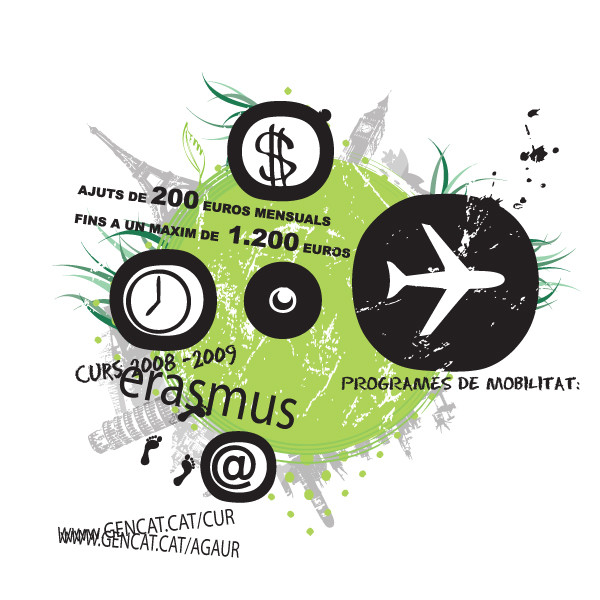I'm an Erasmus student... And now what?

After having focused my last few posts on how to become an Erasmus student, today I am going to answer the next question: What do I have to do once I am definitely an Erasmus student?
I have already said that until you accept your place you are not definitely an Erasmus student, and once you have accepted and communicated with your home University, you have to follow a series of other steps:
- Follow your study plan that you made previously with your Academic Coordinator and get approval for any kind of changes you have to make to that plan.
- Complete the period of stay according to your host University and make sure that you meet all the requirements (exams, homework, etc. ) of your chosen subjects.
- Agreeing with the previous statement, if, having received the Erasmus Grant, a student then proceeds to end the placement earlier than previously agreed, they will need to refund the corresponding amount of money back to the host University. Furthemore, the incomplete Erasmus agreement in this case could lead to sanctions such as the cancellation of the University course or the beginning of enforcement proceedings.
- Withdrawal from the programme, after the approval of your Erasmus Agreement and acceptance as an Erasmus student, without justifiable cause and additional documentation proving this cause, could lead to the expulsion of a student from participating in programmes and courses organised and run by the Area of International Relations in the following academic year.
This means that, of course, we cannot sign ourselves up for whatever subject we like in our host University, like one that has nothing to do with our original course. Your Coordinator always has to accept it and if this is not the case, those subjects will not be worthwhile in your University; that is to say, they will not be validated. So, if you have any doubt, don't think twice about it and go and talk to your Erasmus Coordinator, they are there for that exact reason.
It is logical that if your University placement is 10 months long, for example, then you have to be there for 10 months. It is easy to know whether the student has actually stayed for the required months, through means of certified documents that I will tell you about, but there is more. If you do not stay for your allocated time in your host University, part of your Erasmus Grant will be deducted.
In other words, you know who you are, you will not be able to escape the refund of the money they gave you in any way, and so for this reason it is better to finish your entire placement and therefore avoid any unwanted surprises. It is as simple as if your agreement is for six months, you arrive early and you can leave after just six months, or if you want to stay longer, there is no reason why you can't - there is only a problem if you leave early.

Once again, if you want to go on Erasmus and you have arrived and accepted your place, why would you back down at the last minute? Although it seems like it doesn't make any sense, there are always people who do it: they arrive at their destination, and after a couple of days they give up and decide to wave the white flag of defeat and return to their home cities, losing out on the experience of a lifetime. On top of that, they lead themselves into receiving a fine that will probably stop them from being able to leave any similar programme in their University over the next couple of years.
Once here, your strength is that fear affects everyone; it seems that it cannot be avoided in any way. Therefore, I will just tell people that if you are not very sure what you are going to do, don't do it; so you can leave the opportunity to other students who really want to enjoy this programme.
These are the basic points that you are accepting when you finish sending your application and acceptance of your place on Erasmus, but now we need to answer the question of:
What do I do now?
So, your home University will give you an explanation of Erasmus in upcoming talks and lectures, therefore it wouldn't hurt if you went to them and found out what is going on over there. Apart from covering the basics in these meetings, your University will try to answer all of your different questions about things, and so for this reason this is your opportunity to leave nothing unsaid. Furthermore, they will show you all the different University staff that will be able to help you with any of these topics, including the different Erasmus Coordinators who will be your professors that confirm your Learning Agreement and resolve all of your problems before your departure.
These people should know all types of information about your host city. Therefore, you should go to chat with them from time to time because they will not only know about your city, but you will also be able to ask them various questions about the whole country and even who is the person (if there is one) who will accompany you to that destination city next year, making everything easier.

What paperwork do I have to do before I leave in September to go on my Erasmus Placement?
- The Application Form: this is the document that we have to send to the host University in which we inform them that we are going to be a part of their University during the next academic year, and we tell them a little about ourselves. Not just the typical information about our name, surname, ID, etc, etc, but also about ourselves so that they know who is coming to their University. They will ask us some questions like why we have chosen their city or about our personal interests.
- Accommodation: it is clear that your host University will offer you some help in finding some accommodation, and in many occasions they will give you help with the spoken language in your host country, like in my case when I arrived I had no idea about the language (it was Polish in my case). Because of this, if we want them to find us somewhere to live within their University Halls of Residence (if they offer it, of course), then we must not wait too long and send them everything they need to do so as soon as possible.
I don't know if anyone reads all of that, but we need to take into account the possible level of languages that we will need to complete within these application forms. There are usually two or three, so we it won't take long for us to complete them and finish the first step as soon as we can. Many Universities require you to send certificates to your host city, so you must simply send them by fax to the International Relations Department at your University.
The places are as they are, and if you are too delayed, you can be excited to live in Halls of Residence, but then find out that there aren't any places left for you. It is because of this that I have put it as number two on this list and I'm telling you to think about it as soon as possible so that you can make a decision. There is always the question of finding a house or living in Halls of Residence, but it is only the Halls of Residence that have the limited places, and so you need to think about it and reply as fast as possible. Find information about each of the different possibilities that the city can offer you, which is easy enough with the use of the Internet, so there is no excuse for waiting for too long.
If we still are questioning it and it seems like the pros and cons are the same, stay calm because shortly I am going to write an article about the advantages and disadvantages of Residence vs House so that we can clearly see what each one offers and make the best decision about what we are looking for.
To be continued...

Photo gallery
Content available in other languages
- Español: Soy Erasmus..... ¿y ahora qué?
- Italiano: Sono Erasmus...e adesso?
Want to have your own Erasmus blog?
If you are experiencing living abroad, you're an avid traveller or want to promote the city where you live... create your own blog and share your adventures!
I want to create my Erasmus blog! →







Comments (1 comments)
Hi im a student of mersin university , turkey. i was wondering if i apply for erasmus exchange program, in the end can i apply in that university to study there and not go back to my home university?
looking forward for your generous reply....
Thank you